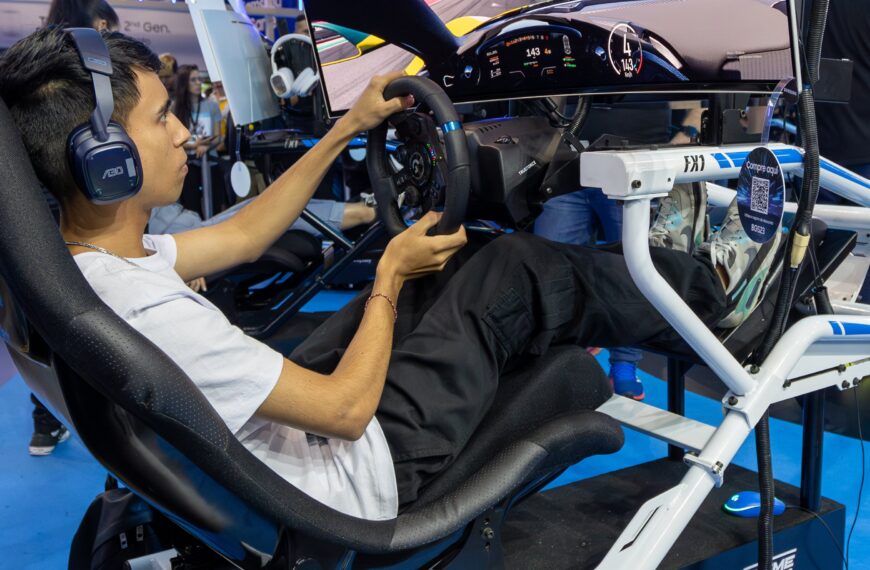“A Guide to Pressing Your Luck: Exploring the Excitement of Press-Your-Luck Games” provides a comprehensive overview of the press-your-luck game mechanism. It delves into the thrilling experience of these games, highlighting the elements of excitement, tension, and player choice that come into play when taking risks based on luck. Whether it’s the roll of a dice or the decision to push forward in the face of uncertainty, press-your-luck games offer a unique blend of chance and strategy. The article also emphasizes the importance of incorporating valid risks and worthy rewards to maintain the desired level of tension and excitement. While there is a possibility of sweeping failure or success, the article further suggests a variety of recommended press-your-luck games, such as Zombie Dice, Can’t Stop, and Incan Gold. With these recommendations and a deeper understanding of the concept, readers will be well-equipped to embark on a thrilling journey into the world of press-your-luck games.

Understanding Press-Your-Luck Games
Press-your-luck games are a popular category of board games that focus on the excitement, tension, and player choice involved in taking risks based on luck. In these games, players are faced with decisions on whether to continue pushing their luck or play it safe. Understanding the key elements and mechanics of press-your-luck games is crucial for effectively playing and strategizing in these games.
Definition of Press-Your-Luck Games
Press-your-luck games, as the name suggests, revolve around the concept of pushing one’s luck. These games typically involve taking risks and making choices based on the roll of dice, the location of in-game elements, or the ticking of a timer. The primary objective of these games is to strike a balance between risk and reward, making strategic choices to maximize success while mitigating potential failure.
Key Elements of Press-Your-Luck Mechanics
The key elements that define press-your-luck mechanics are the risk-reward dynamic, luck-based outcomes, and player decisions. In these games, players face uncertain outcomes determined by chance, such as the roll of dice or the drawing of cards. The tension arises from the choice to continue pursuing favorable outcomes, even as the risk of failure increases. This delicate balance between risk and reward is what makes press-your-luck games so engaging and psychologically thrilling.
Role of Luck in Press-Your-Luck Games
Luck plays a significant role in press-your-luck games, as it determines the outcomes of players’ actions. Depending on the game, luck can manifest through dice rolls, card draws, or other random elements. This element of chance adds an exciting and unpredictable aspect to these games, as players must contend with the possibility of both success and failure. Luck acts as the driving force behind the decision-making process, providing opportunities for players to assess risks and determine their best course of action.
Different Types of Press-Your-Luck Games
Press-your-luck games can be categorized into three main types: dice-based, location-based, and time-based. Each type has its own distinct mechanics and gameplay elements that contribute to the overall press-your-luck experience.
Dice-Based Press-Your-Luck Games
Dice-based press-your-luck games are among the most common and recognizable in the genre. These games utilize dice rolls as the primary source of luck and determine the outcomes of players’ actions. Players are often tasked with making decisions on whether to continue rolling the dice or stop and secure their progress. The push-or-stop dilemma is a defining characteristic of dice-based press-your-luck games, as players must carefully weigh their chances of success against the risk of failure.
Location-Based Press-Your-Luck Games
In location-based press-your-luck games, the concept of location adds a layer of tension and decision-making to the gameplay. Players navigate through various in-game locations, each offering different risks and rewards. The choices players make about which locations to explore or exploit can significantly impact their success or failure. Understanding the strategic value of each location becomes crucial in these games, as players must evaluate their risks and rewards before committing to a course of action.
Time-Based Press-Your-Luck Games
Time-based press-your-luck games introduce the element of time constraints into the gameplay. Players have a limited amount of time to make decisions or complete certain actions before facing negative consequences. This added time pressure intensifies the risk-reward dynamic, forcing players to make strategic choices quickly. Time-based press-your-luck games demand a sense of urgency and adaptability from players, as they must effectively gauge the right time to press forward or cut their losses.

Dice-Based Press-Your-Luck Games
Dice-based press-your-luck games serve as an excellent entry point for newcomers to the genre due to their straightforward mechanics and easy-to-understand gameplay. Understanding how these games work, developing effective strategies, and exploring popular titles in this subcategory will provide a strong foundation for exploring other press-your-luck game types.
How Dice-Based Press-Your-Luck Games Work
In dice-based press-your-luck games, players typically roll a set of dice and must choose whether to continue rolling or stop and secure their progress. Each roll presents a chance for success, but with it comes an increased risk of failure. The player’s objective is to accumulate points or achieve specific outcomes determined by the game’s rules. The excitement lies in the decision-making process, as players weigh their chances of rolling favorable results against the potential loss of progress if they experience bad rolls.
Strategies for Dice-Based Press-Your-Luck Games
A successful strategy in dice-based press-your-luck games revolves around understanding probabilities and managing risk. Calculating the odds of rolling specific outcomes can help players make more informed decisions. It is essential to assess the potential risks and rewards of each additional roll and determine the optimal point to stop, ensuring that progress is secured without risking losing everything. Balancing caution with calculated risk-taking is key to maximizing success in these games.
Popular Dice-Based Press-Your-Luck Games
Several popular dice-based press-your-luck games have captivated players worldwide. Zombie Dice, Martian Dice, and Dungeon Roll are highly regarded in this category. Zombie Dice challenges players to gather brains while avoiding shotgun blasts, while Martian Dice sees players abducting different Earth creatures. Dungeon Roll, on the other hand, tasks players with exploring a dungeon filled with monsters and treasure. These games offer varying levels of complexity and strategic depth, catering to a wide range of player preferences.
Location-Based Press-Your-Luck Games
Location-based press-your-luck games introduce a spatial element to the gameplay, creating decision-making situations based on the exploration or exploitation of different in-game locations. Understanding the concept of location, the role it plays in player decision-making, and exploring notable examples of this game type will facilitate a deeper appreciation for the genre.
Understanding the Concept of Location in Press-Your-Luck Games
In location-based press-your-luck games, locations represent different opportunities and risks within the game’s world. Players must navigate through these locations, making choices on where to venture or exploit. Each location offers its own set of risks and rewards, and players must weigh these factors before committing to an action. The strategic value of each location becomes fundamental to success, as players must analyze potential outcomes and make calculated decisions in pursuit of their objectives.
Adding Tension and Decision-Making with Location-Based Press-Your-Luck Games
Location-based press-your-luck games excel at creating tension and excitement by introducing decision-making scenarios tied to specific locations. The inherent risk-reward dynamic becomes more nuanced as players face dilemmas of whether to explore new locations or exploit previously discovered ones. The fear of missing out on potentially lucrative opportunities competes against the fear of encountering adverse outcomes. This constant balancing act keeps players engaged and invested in the game, reinforcing the appeal of location-based press-your-luck games.
Notable Examples of Location-Based Press-Your-Luck Games
Several noteworthy examples of location-based press-your-luck games showcase the diversity and creativity within this subcategory. Board games like Incan Gold immerse players in a perilous treasure-hunting expedition, where they must navigate through dangerous paths while deciding when to abandon their progress and secure their findings. Other games like Lords of Vegas combine location-based gameplay with strategic property management, allowing players to take risks and build their real estate empires. Exploring these and other notable location-based press-your-luck games offers players a wealth of engaging experiences and challenges.

Time-Based Press-Your-Luck Games
Time-based press-your-luck games introduce a sense of urgency and time constraints, forcing players to think and act quickly. Understanding how time influences decision-making, implementing effective strategies, and exploring recommended titles in this category will enhance players’ ability to thrive in time-based press-your-luck games.
Introducing Time Constraints in Press-Your-Luck Games
Time constraints in press-your-luck games serve to heighten the sense of tension and urgency. Players are given a limited amount of time to make decisions or complete specific actions, with consequences awaiting those who fail to act promptly. The presence of time constraints forces players to evaluate risks and rewards more rapidly, testing their ability to make quick and calculated decisions under pressure.
Strategic Decision-Making in Time-Based Press-Your-Luck Games
Strategic decision-making in time-based press-your-luck games centers around optimizing actions within the given time frame. Players must identify and prioritize goals, gauge the potential outcomes of each decision, and assess their feasibility within the time constraints. The ability to evaluate risks quickly, choose the most rewarding actions, and adapt to changing circumstances becomes paramount. Effective time management and the ability to balance risk and reward make a significant difference in achieving success in time-based press-your-luck games.
Recommended Time-Based Press-Your-Luck Games
Several time-based press-your-luck games have garnered praise for their innovative mechanics and captivating gameplay. One notable example is Escape: The Curse of the Temple, where players must work together in real-time to explore a cursed temple and escape before time runs out. Another recommendation is Fuse, a cooperative game where players race against the clock to defuse a series of bombs. These games offer intense and pulse-pounding experiences, challenging players to make lightning-fast decisions under duress.
Balancing Risk and Reward
A crucial aspect of press-your-luck games is the delicate balance between risk and reward. Designers must ensure that games offer valid risks and compelling rewards to maintain player engagement and excitement.
Importance of Valid Risk in Press-Your-Luck Games
Valid risk is fundamental to the success of press-your-luck games. Players must perceive the risks they take as fair and meaningful, ensuring that their decisions carry weight and consequence. Without valid risk, the tension and excitement inherent in press-your-luck games may dissipate, resulting in a less engaging experience. Designers must carefully craft and balance the risk-reward dynamic, ensuring that players’ choices feel impactful and dependent on their decision-making skills.
Designing Worthy Rewards in Press-Your-Luck Games
Worthy rewards are essential components of press-your-luck games, as they motivate players to take risks and pursue success. The rewards should align with the game’s objectives and make the risks worthwhile. Designers must consider the balance between the potential rewards and the risks involved to ensure that players feel adequately rewarded for their achievements. By providing enticing rewards, designers can incentivize players to continue pressing their luck and heighten the overall excitement and enjoyment of the game.
Maintaining Tension and Excitement in Press-Your-Luck Games
Maintaining tension and excitement is crucial in press-your-luck games to keep players engaged throughout the gameplay. Designers can achieve this by varying the intensity of risks, implementing surprise elements, and creating opportunities for strategic decision-making. The element of surprise, such as unexpected events or unpredictable outcomes, adds unpredictability and excitement to the game. By continuously challenging players with calculated risks, designers can create a captivating gameplay experience that keeps players on the edge of their seats.
Drawbacks of Press-Your-Luck Games
While press-your-luck games offer thrilling experiences, there are potential drawbacks that can affect players’ enjoyment and overall satisfaction. Understanding these drawbacks and implementing strategies to mitigate them can enhance the overall experience of playing press-your-luck games.
Potential for Sweeping Failure in Press-Your-Luck Games
Sweeping failure represents a significant drawback of press-your-luck games. Players who encounter a string of bad luck may experience a rapid and substantial loss of progress or resources. This can lead to frustration and a feeling of helplessness, undermining the enjoyment of the game. Designers should consider implementing mechanisms to mitigate sweeping failure, such as introducing progressive risk escalation or opportunities for redemption, to provide players with a sense of hope and the ability to recover from setbacks.
Possibility of Too Much Success in Press-Your-Luck Games
Conversely, press-your-luck games also run the risk of a player achieving too much success. If a player consistently rolls or acts favorably without facing significant consequences, the game can lose its challenge and excitement. To avoid this drawback, designers should incorporate mechanisms that maintain tension and incentivize players to take reasonable risks. Introducing additional layers of complexity or scaling risks based on player progress can help ensure that success is hard-earned and that the game remains engaging.
Mitigating Drawbacks of Press-Your-Luck Games
To mitigate the potential drawbacks of press-your-luck games, designers can employ several strategies. Implementing built-in catch-up mechanisms can aid players who experience sweeping failure, allowing them to recover and remain competitive. Adopting balanced game mechanics and risk-reward dynamics ensures that players do not encounter excessive success or failure. Playtesting and soliciting feedback from players can also help identify potential issues and fine-tune the game’s balance, providing an enjoyable and fair experience for all participants.
Popular Press-Your-Luck Games
Press-your-luck games have gained popularity among board game enthusiasts, with certain titles standing out for their engaging gameplay and innovative mechanics. These games provide excellent examples of the various press-your-luck subgenres and showcase the excitement and strategic decision-making the genre has to offer.
Zombie Dice/Martian Dice/Dungeon Roll
Zombie Dice, Martian Dice, and Dungeon Roll are notable examples of dice-based press-your-luck games. In Zombie Dice, players take on the roles of zombies hungry for brains, with each dice roll determining their success in capturing their desired meal while avoiding shotgun blasts. Martian Dice presents a similar mechanic, but with alien abductions of Earth creatures. Dungeon Roll introduces dungeon exploration with the roll of dice, challenging players to strategically manage resources while facing dangerous monsters and uncovering valuable treasure.
Can’t Stop
Can’t Stop is a classic press-your-luck game renowned for its addictive gameplay and simplicity. Players roll dice, aiming to advance their pieces up three numbered tracks. However, they must decide when to stop rolling and lock in their progress, as a failed roll can result in losing all the advances made. Can’t Stop’s balancing of risk and reward, coupled with its easy-to-learn mechanics, makes it a perennial favorite among both casual and seasoned gamers.
Incan Gold
Incan Gold is a location-based press-your-luck game set in a treacherous temple filled with hidden treasure and dangerous traps. Players explore deeper into the temple, deciding if they should continue pressing their luck or leave with their accumulated loot. The allure of riches competes against the fear of encountering hazards that can wipe out a player’s progress. Incan Gold’s engaging gameplay, combined with its beautiful artwork and immersive theme, positions it as a standout example of location-based press-your-luck games.
Other Noteworthy Press-Your-Luck Games
Beyond the aforementioned titles, numerous press-your-luck games deserve recognition for their unique mechanics and captivating gameplay experiences. Examples include Deep Sea Adventure, where players compete to collect the most valuable treasures from the ocean floor while managing their oxygen supply and risking collapse. Quacks of Quedlinburg combines press-your-luck mechanics with bag-building, as players draw ingredients from their bags to create potions while hoping to avoid disastrous ingredient combinations. These and other standouts in the genre offer diverse gameplay experiences, catering to different player preferences and providing ample opportunities for excitement and strategic decision-making.
Playing Press-Your-Luck Games Strategically
To excel in press-your-luck games, players must adopt strategic approaches that maximize their chances of success while managing risks effectively. Understanding probabilities, calculating expected values, and developing personal strategies are vital aspects of strategic play in this genre.
Understanding Probabilities in Press-Your-Luck Games
Understanding probabilities is crucial in press-your-luck games, as it allows players to make informed decisions based on the likelihood of specific outcomes. Analyzing the probability of rolling desired results or encountering negative consequences helps players assess risks and make optimal choices. While luck ultimately determines the outcomes, a deep understanding of probabilities empowers players to adjust their strategies accordingly, making the most statistically favorable decisions during gameplay.
Managing Risk and Knowing When to Stop
Managing risk is a key facet of strategic play in press-your-luck games. Players must carefully evaluate the potential risks and rewards of each action they take and decide when to push on or stop. This requires a keen understanding of the game’s mechanics, the current state of play, and the potential consequences of further pressing one’s luck. Recognizing the optimal point to stop, ensuring progress is secured, and avoiding excessive risks is essential for long-term success.
Developing Personal Press-Your-Luck Strategies
Developing personal press-your-luck strategies is essential for players to maximize their chances of success and enjoy the game to its fullest. Each player has their own risk tolerance, decision-making style, and preferred balance between risk and reward. Experimenting with different approaches and reflecting on past gameplay experiences can help players refine their strategies and develop a playbook that aligns with their preferences and playstyle. Personal strategies also add layers of depth and enjoyment to press-your-luck games, encouraging players to explore different paths to victory and adapt to varying in-game circumstances.
Conclusion
Press-your-luck games offer a unique and thrilling gaming experience, combining luck, risk, and strategic decision-making. Understanding the key elements and mechanics of press-your-luck games, as well as exploring the different subgenres, allows players to appreciate the intricacies and excitement of this genre. Whether it’s dice-based games, location-based challenges, or time-based races against the clock, press-your-luck games offer a wealth of opportunities for players to engage, strategize, and immerse themselves in captivating gameplay. By mastering the art of balancing risk and reward, mitigating potential drawbacks, and adopting strategic approaches, players can maximize their enjoyment and success in press-your-luck games. So gather your dice, choose your destination, and press your luck for an exhilarating gaming experience!








